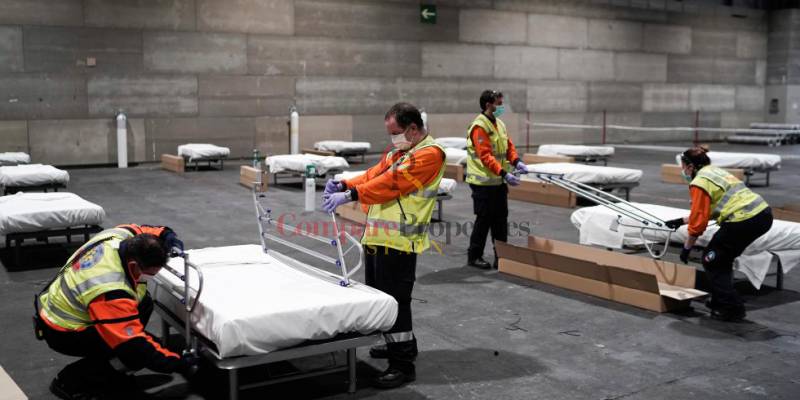
Provison of a new hospital in Madrid
The coronavirus epidemic is advancing in Spain, although its real incidence is not yet clear, nor to what extent it affects each demographic group. After almost two months of the first case detected, there is no census that clearly breaks down victims by age, pathology and sex, as other countries hit by Covid-19 do, such as Italy. This will be ready "in the coming days," said María José Sierra, area chief of the Center for Coordination of Health Alerts and Emergencies (CCAES), which has provided some details: half of the hospitalized patients are over 70 years, and about 70% of those admitted to the ICU, are over 60. Among those under 30, the incidence of hospitalization is between 5% and 10%, and among those under 20, between 1% and 2%. "Spain follows the trend that has been seen in other countries," said Sierra.
Hospital and death figures most clearly reflect the reality of the epidemic, as most of the evidence is focusing on the most serious cases, not the mildest. And, in 24 hours, the number of critically ill patients has skyrocketed: 471 patients, that is, 41% more than this Friday, to add up to 1,612. It is the highest number in a day since the beginning of the crisis. Spain touches the 25,000 cases of Covid-19, and already reaches 1,326 deaths, according to the latest figures from the Ministry of Health, on Saturday at noon. After adding updates to the autonomous communities to the count, the figure rose to 1,351 at seven o'clock on Saturday afternoon.
This increase in ICU is mainly due to new information in Catalonia, although there is some disparity between the figures provided by the Government and the Generalitat, which also report at different times of the day. According to data from the ministry, they have gone from 33 to 298 in the last hours, 803% more. Health has collected the same number of serious patients, 33, since Monday. However, the comparison with the data provided by the Generalitat shows that these have been increasing more gradually with a steep rise, although not so much, on the last day.
In addition to this lack of clarity in cases, numbers and ages, new data on diagnostic tests are added. Raquel Yotti, director of the Carlos III Health Institute, said on Saturday that 355,000 Polymerase Chain Reaction (PCR) tests have already been completed to detect the virus and that between 15,000 and 20,000 a day, "at the same rate as the countries that are doing the most." Only a week earlier, the Minister of Health, Salvador Illa, had said that since the first case, only something "more than 30,000" had been made. Fernando Simón, director of the CCAES, who did not appear this Saturday for presenting symptoms compatible with the Covid-19 —although he subsequently tested negative— had explained during the week that new rapid tests would be launched in the near future, after assuming that The logistical capacity to carry out PCR was limited and that did not allow us to know the magnitude of the epidemic in Spain. Subsequently, the Secretary of State for Communication has explained in a statement the figure that Illa gave was partial: “After declaring the state of alarm, the information has been completed and the 355,000 PCR determinations to which he alluded this afternoon at the Raquel Yotti press, correspond to data obtained from the count of hospitals and also from providers ".
Yotti has announced that tests are being carried out with robots to run the tests much faster, at a capacity of 80,000 a day, something that we could see in the coming days. He has also assured that in the next few years the government will acquire a million rapid tests. The Prime Minister, Pedro Sánchez, in a subsequent intervention added that the purchase of six million of these tests is being negotiated.
One of the problems the system is encountering is with a “very aggressive" international market for the acquisition of health products, in the words of Patricia Lacruz, general director of the Basic Portfolio of Services of the National Health and Pharmacy System. In this sense, the ministry is working on four fronts: reinforcing the acquisition of products; support national manufacturers to increase production; reorient the activity of related sectors, such as cosmetics, to manufacture hydroalcoholic solution in Spain, and increase equipment in hospitals. Lacruz has explained that personal protective equipment and respirators are being strengthened, two critical elements to fight the disease. According to what he has said, half a million masks will be distributed for medical staff, and about 800,000 for patients.











